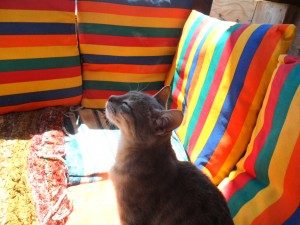I have always avoided the Happy song because the falsetto voices get stuck in my head for long hours on end and I think it’s the worst. But when I went to Egypt, I couldn’t get away from it. It was always playing in shops and in markets, in restaurants and on dance floors, blaring from the stereos of cab drivers or from the voices of locals belting out the words in the streets.
The city of Dahab featured in this video was my favourite of the three Egyptian cities I recently visited. I have to admit I’m grateful these Happy videos are popping up online right now, because this one captures the spirit of Dahab in a way that I never could by simply typing words on a screen.
Ironically, that video was released online shortly after I got back to Canada, and it almost recreates the atmosphere perfectly. If you can imagine that song somehow merged with everyone and everything you’d encounter during a day, if you look closely at the facial expressions of the people in the video and imagine being constantly surrounded by that kind of boundless positivity, to the point that you want to bust out the lyrics to the Happy song yourself, then you can almost imagine what Dahab is like.
The word Dahab actually means “gold” in Egyptian Arabic. According to a couple of my Egyptian friends (and Wikipedia), its probably for historical reasons, as gold was rumored to have washed down from the mountains during rainstorms, accumulating along the flatter plains of the city.
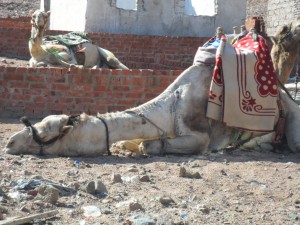
I think the name is suitable though, because Dahab really is like a hidden gem worth hunting for. To get there, we had to take a plane from Cairo to a nearby beach resort town called Sharm El-Sheikh, and then drive for 90 minutes across the South Sinai peninsula. My older sister (who has been living in Egypt for 2 years and is the reason I went there in the first place) assured me that taking the complicated trip would be worth it.
It poured rain the day we planned our trip, and the roads were closed for a full day from flood damage(leave it to a couple of east-coast Canadians to bring rain to a region where it never rains).
We spent the night at a hotel in Sharm and tried again the next day. We still almost didn’t make it, even our massive land rover couldn’t get over some of the boulders that had washed onto the roads. We passed cars that had gotten stuck in giant holes where the road had completely washed away. What’s normally a 90-minute commute from took us over two hours that day.
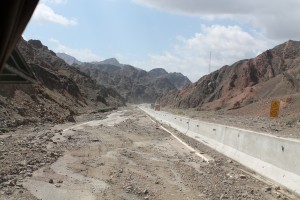
We also passed through several security check points, where armed guards with AK 47’s looked at our passports and questioned our driver before letting us continue. Although the stops were intimidating they were actually put in place for the safety of tourists.
Official warnings had been made against travel in the South Sinai about a month earlier, when three South Korean tourists were attacked and killed on their bus, supposedly by a militant Islamist group.
We laughed nervously about the stops afterwards, but those minutes seemed to drag on. The experience of having a gun pointed at me felt completely unfamiliar and tense. A few of my sister’s neighbors and drivers had warned us about the dangers of the roads in the Sinai, and at each security stop I wondered if this plan was a mistake.
In typical Dahab spirit though, our driver was pleasant during the whole unpredictable trip. So were the stranded drivers we saw along the way, sitting outside their cars in a circle around a hole in the road while talking, laughing and listening to music on their phones. They waved at us when we passed, just hanging out with no apparent distress over their situations. The lightheartedness of it made that long daunting drive seem almost bearable.
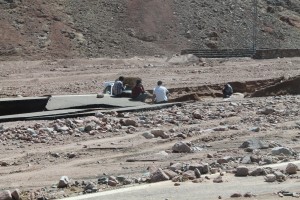
But once we arrived, everyone was this same kind of carefree and the struggles of the trip seemed irrelevant. In Dahab I didn’t feel like a tourist, but like a welcomed guest sharing a secret. I joked and bartered with local merchants, took in vibrantly colored sunsets and smoked crazy amounts of flavored shisha in beach huts on the Red Sea. It’s no wonder people in Dahab identify so well with the Happy song, happiness seems to be their whole city’s essence.
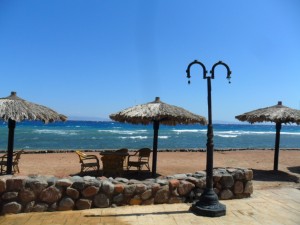
The energy created when people are relating to one another can be felt in the best way during moments of travel. In the humility of a bad situation, the beauty of ocean scenery or over the shared love (or loathing) of a pop culture song. That’s what compels me to keep going new places, even when intimidated: the-almost-instinctual urge to bring my attention back to the things that matter, the need for a reminder that some things that are the same for all humanity.
I found the perfect satisfaction to this urge in Dahab. I’d go back a thousand times just to relive its energy, a completely relaxed, extra-friendly vibe that provided such a welcome contrast to the constant intensity of Cairo. Even Sharm El-Sheikh, though beautiful, still isn’t quite the same; it has more of a cater-to-the-tourists feel, whereas Dahab is genuine, warm and rich in its own unique culture. A noticeably refreshing alternative to Egypt’s underlying angst, the empty beaches and lonely attractions stir feelings of hope rather than desperation, blatant proof that a city’s energy can have a profound impact
So incidentally I gave Pharrell’s song another chance, since it was practically a constant companion on my travels through the South Sinai. It still gets stuck in my head but now I don’t mind so much.
